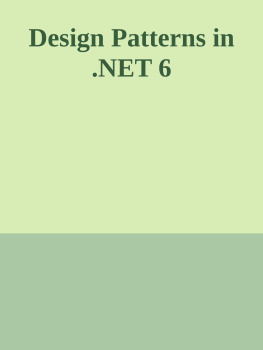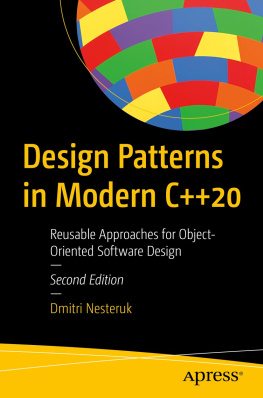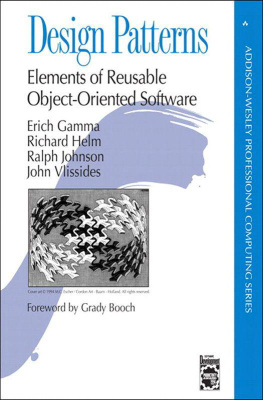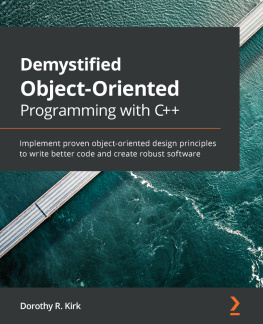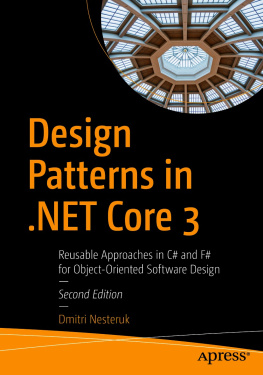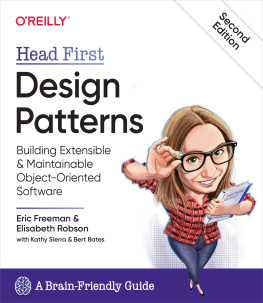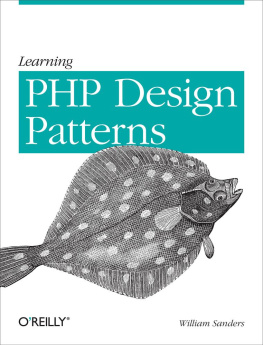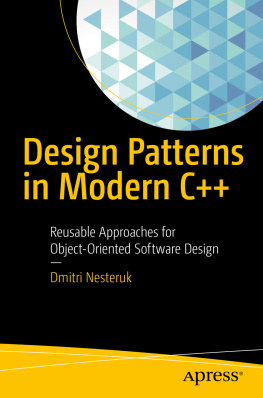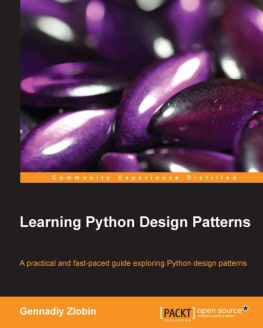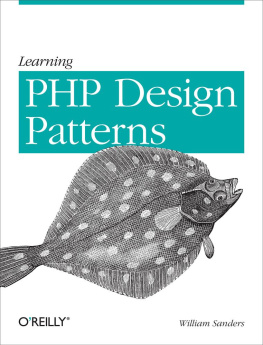Addison-Wesley Professional Computing Series
Brian W. Kernighan, Consulting Editor
Matthew H. Austern, Generic Programming and the STL: Using and Extending the C++ Standard Template Library
David R. Butenhof, Programming with POSIX Threads
Brent Callaghan, NFS Illustrated
Tom Cargill, C++ Programming Style
William R. Cheswick/Steven M. Bellovin/Aviel D. Rubin, Firewalls and Internet Security, Second Edition: Repelling the Wily Hacker
David A. Curry, UNIX System Security: A Guide for Users and System Administrators
Stephen C. Dewhurst, C++ Gotchas: Avoiding Common Problems in Coding and Design
Dan Farmer/Wietse Venema, Forensic Discovery
Erich Gamma/Richard Helm/Ralph Johnson/John Vlissides, Design Patterns: Elements of Reusable Object-Oriented Software
Erich Gamma/Richard Helm/Ralph Johnson/John Vlissides, Design Patterns CD: Elements of Reusable Object-Oriented Software
Peter Haggar, Practical Java Programming Language Guide
David R. Hanson, C Interfaces and Implementations: Techniques for Creating Reusable Software
Mark Harrison/Michael McLennan, Effective Tcl/Tk Programming: Writing Better Programs with Tcl and Tk
Michi Henning/Steve Vinoski, Advanced CORBA Programming with C++
Brian W. Kernighan/Rob Pike, The Practice of Programming
S. Keshav, An Engineering Approach to Computer Networking: ATM Networks, the Internet, and the Telephone Network
John Lakos, Large-Scale C++ Software Design
Scott Meyers, Effective C++ CD: 85 Specific Ways to Improve Your Programs and Designs
Scott Meyers, Effective C++, Third Edition: 55 Specific Ways to Improve Your Programs and Designs
Scott Meyers, More Effective C++: 35 New Ways to Improve Your Programs and Designs
Scott Meyers, Effective STL: 50 Specific Ways to Improve Your Use of the Standard Template Library
Robert B. Murray, C++ Strategies and Tactics
David R. Musser/Gillmer J. Derge/Atul Saini, STL Tutorial and Reference Guide, Second Edition: C++ Programming with the Standard Template Library
John K. Ousterhout, Tel and the Tk Toolkit
Craig Partridge, Gigabit Networking
Radia Perlman, Interconnections, Second Edition: Bridges, Routers, Switches, and Internetworking Protocols
Stephen A. Rago, UNIX System V Network Programming
Eric S. Raymond, The Art of UNIX Programming
Marc J. Rochkind, Advanced UNIX Programming, Second Edition
Curt Schimmel, UNIX Systems for Modern Architectures: Symmetric Multiprocessing and Caching for Kernel Programmers
W. Richard Stevens, TCP/IP Illustrated, Volume 1: The Protocols
W. Richard Stevens, TCP/IP Illustrated, Volume 3: TCP for Transactions, HTTP, NNTP, and the UNIX Domain Protocols
W. Richard Stevens/Bill Fenner/Andrew M. Rudoff, UNIX Network Programming Volume 1, Third Edition: The Sockets Networking API
W. Richard Stevens/Stephen A. Rago, Advanced Programming in the UNIX Environment, Second Edition
W. Richard Stevens/Gary R. Wright, TCP/IP Illustrated Volumes 1-3 Boxed Set
John Viega/Gary McGraw, Building Secure Software: How to Avoid Security Problems the Right Way
Gary R. Wright/W. Richard Stevens, TCP/IP Illustrated, Volume 2: The Implementation
Ruixi Yuan/W. Timothy Strayer, Virtual Private Networks: Technologies and Solutions
Visit www.awprofessional.com/series/professionalcomputing for more information about these titles.
Design Patterns
Elements of Reusable Object-Oriented Software
Erich Gamma
Richard Helm
Ralph Johnson
John Vlissides

Boston San Francisco New York Toronto Montreal
London Munich Paris Madrid
Capetown Sidney Tokyo Singapore Mexico City
Material from A Pattern Language: Towns/Buildings/Construction by Christopher Alexander, copyright 1977 by Christopher Alexander is reprinted by permission of Oxford University Press, Inc.
Many of the designations used by manufacturers and sellers to distinguish their products are claimed as trademarks. Where those designations appear in this book, and we were aware of a trademark claim, the designations have been printed in initial capital letters or in all capitals.
The author and publisher have taken care in the preparation of this book, but make no expressed or implied warranty of any kind and assume no responsibility for errors or omissions. No liability is assumed for incidental or consequential damages in connection with or arising out of the use of the information or programs contained herein.
The publisher offers discounts on this book when ordered in quantity for special sales. For more information, please contact:
Pearson Education Corporate Sales Division
201 W. 103rd Street
Indianapolis, IN 46290
(800) 428-5331
Visit AW on the Web: www.awprofessional.com
Library of Congress Cataloging-in-Publication Data
Design Patterns : elements of reusable object-oriented software / Erich Gamma ... [et al.].
p. cm.(Addison-Wesley professional computing series)
Includes bibliographical references and index.
ISBN 0-201-63361-2
1. Object-oriented programming (Computer science) 2. Computer softwareReusability.
I. Gamma, Erich. II. Series.
QA76.64.D47 1994
005.1'2dc20
94-34264
CIP
Copyright 1995 by Addison-Wesley
All rights reserved. No part of this publication may be reproduced, stored in a retrieval system, or transmitted, in any form, or by any means, electronic, mechanical, photocopying, recording, or otherwise, without the prior consent of the publisher. Printed in the United States of America. Published simultaneously in Canada.
Cover art M.C. Escher/Cordon Art - Baarn - Holland. All rights reserved.
ISBN 0-201-63361-2
Text printed in the United States on recycled paper at Courier Westford in Westford, Massachusetts.
37th Printing March 2009
To Karin
E.G.
To Sylvie
R.H.
To Faith
R.J.
To Dru Ann and Matthew Joshua 24:15b
J.V.
Praise for Design Patterns: Elements of Reusable Object-Oriented Software
This is one of the best written and wonderfully insightful books that I have read in a great long while...this book establishes the legitimacy of patterns in the best way: not by argument but by example.
Stan Lippman, C++ Report
...this new book by Gamma, Helm, Johnson, and Vlissides promises to have an important and lasting impact on the discipline of software design. Because Design Patterns bills itself as being concerned with object-oriented software alone, I fear that software developers outside the object community may ignore it. This would be a shame. This book has something for everyone who designs software. All software designers use patterns; understanding better the reusable abstractions of our work can only make us better at it.
Tom DeMarco, IEEE Software
Overall, I think this book represents an extremely valuable and unique contribution to the field because it captures a wealth of object-oriented design experience in a compact and reusable form. This book is certainly one that I shall turn to often in search of powerful object-oriented design ideas; after all, thats what reuse is all about, isnt it?


